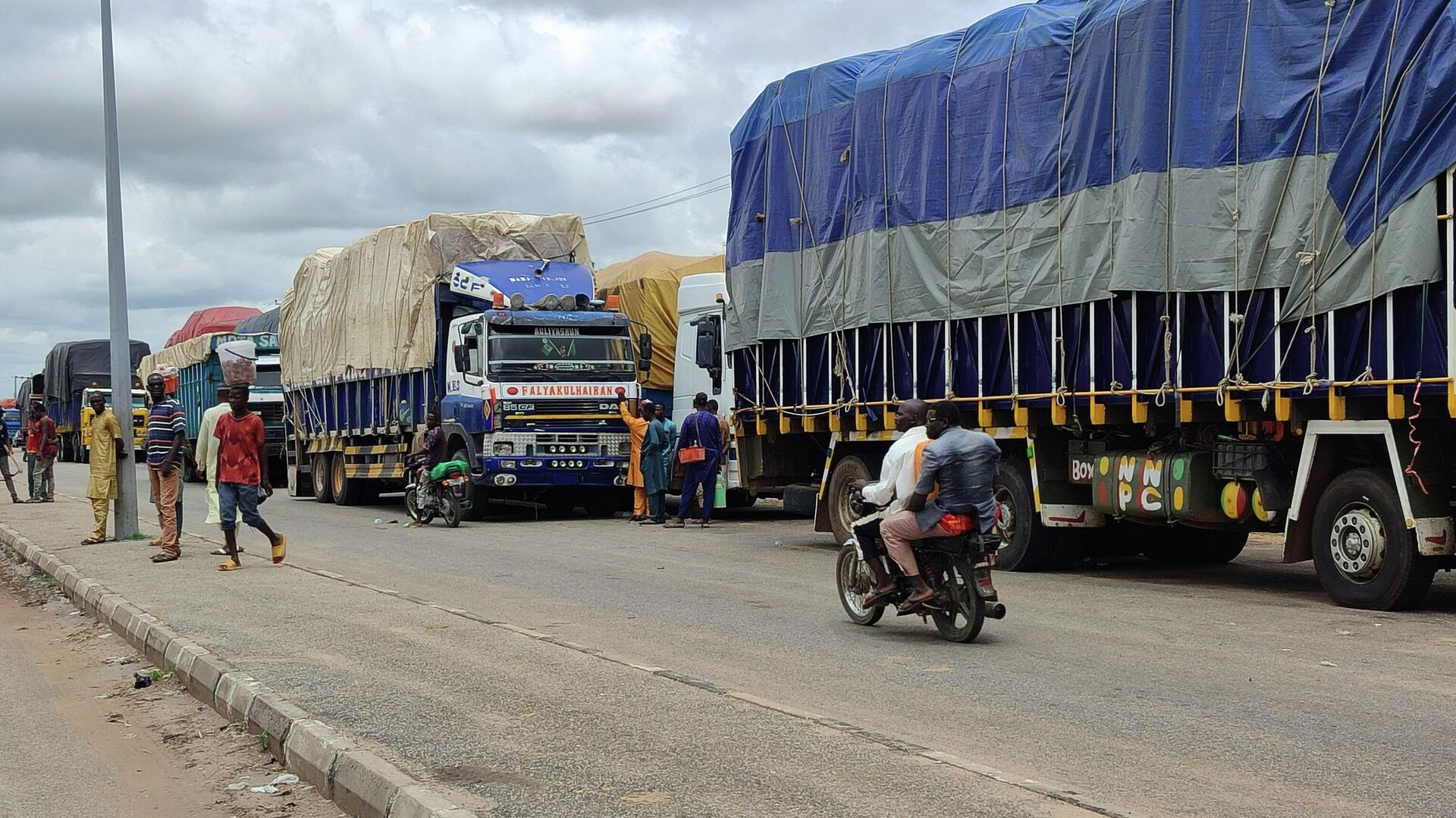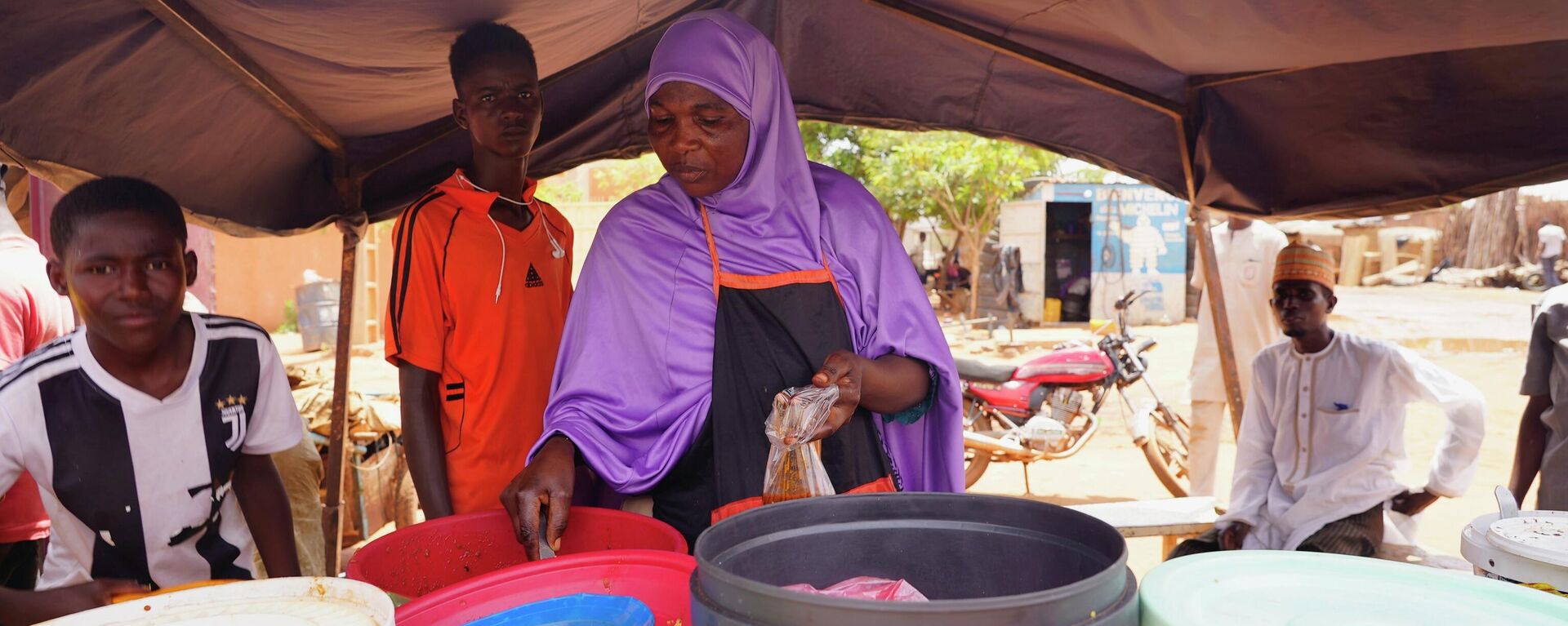https://en.sputniknews.africa/20230809/eu-pleased-sanctions-cause-food-medicine-shortages-in-niger-special-envoy-says-1061204577.html
EU Pleased Sanctions Cause Food, Medicine Shortages in Niger, Special Envoy Says
EU Pleased Sanctions Cause Food, Medicine Shortages in Niger, Special Envoy Says
Sputnik Africa
ROME (Sputnik) - On July 30, in response to a fresh coup in Niger, the Economic Community of West African States (ECOWAS) suspended all financial aid, froze... 09.08.2023, Sputnik Africa
2023-08-09T18:01+0200
2023-08-09T18:01+0200
2023-08-09T18:02+0200
situation in niger after military coup
west africa
european union (eu)
niger
economic community of west african states (ecowas)
sanctions
https://cdn1.img.sputniknews.africa/img/07e7/08/09/1061205509_0:270:3056:1988_1920x0_80_0_0_4e9396451446bcafb1f120d2014ff780.jpg
The European Union is satisfied that ECOWAS sanctions against Niger are starting to take effect by causing a shortage of food and medication in the coup-hit country, EU Special Representative for the African Sahel Emanuela Del Re said on Wednesday. It's worth noting that in addition to ECOWAS, of which Niger is a member, a number of Western countries, including the United States, the United Kingdom and France, have either suspended or threatened to suspend humanitarian aid to Niger, one of the poorest countries in the world, following the coup.French President Emmanuel Macron, for his part, promised to support any sanctions that African regional organizations might impose on those involved in the coup. The European Union soon followed suit.She said that the EU supports ECOWAS in its efforts to put pressure on the Nigerien coup leaders, adding that the West African regional bloc considers military intervention to be a radical measure "which should not be taken." The coup took place in Niger on July 26. President Mohamed Bazoum was ousted and detained by his own guard, led by Gen. Abdourahmane Tchiani. The caretaker National Council for the Safeguard of the Homeland closed the country's borders and broke security agreements with France, its former colonizer. ECOWAS gave coup leaders one week to reinstate Bazoum and restore order, hinting that it would resort to military intervention otherwise. Its ultimatum expired on Sunday.
https://en.sputniknews.africa/20230804/russia-rebukes-us-france-for-ending-assistance-to-niger-after-coup-1061054912.html
west africa
niger
Sputnik Africa
feedback@sputniknews.com
+74956456601
MIA „Rossiya Segodnya“
2023
Sputnik Africa
feedback@sputniknews.com
+74956456601
MIA „Rossiya Segodnya“
News
en_EN
Sputnik Africa
feedback@sputniknews.com
+74956456601
MIA „Rossiya Segodnya“
Sputnik Africa
feedback@sputniknews.com
+74956456601
MIA „Rossiya Segodnya“
west africa, european union (eu), niger, economic community of west african states (ecowas), sanctions
west africa, european union (eu), niger, economic community of west african states (ecowas), sanctions
EU Pleased Sanctions Cause Food, Medicine Shortages in Niger, Special Envoy Says
18:01 09.08.2023 (Updated: 18:02 09.08.2023) ROME (Sputnik) - On July 30, in response to a fresh coup in Niger, the Economic Community of West African States (ECOWAS) suspended all financial aid, froze rebels' assets and imposed a ban on commercial flights to and from the country, as well as closed all borders. Nigeria, Niger's southern neighbor, cut electricity supply to the nation.
The European Union is satisfied that ECOWAS sanctions against Niger are starting to take effect by causing a shortage of food and medication in the coup-hit country, EU Special Representative for the African Sahel Emanuela Del Re said on Wednesday.
"Sanctions are starting to take effect. There is not enough medication, not enough food. Power outages are even more frequent than before. If we want [the Nigerien military] junta to weaken, we must continue with the sanctions," Del Re told Italian daily La Repubblica.
It's worth noting that in addition to ECOWAS, of which Niger is a
member, a number of Western countries, including the
United States, the United Kingdom and France, have either suspended or threatened to suspend humanitarian aid to Niger, one of the poorest countries in the world, following the coup.
French President Emmanuel Macron, for his part, promised to
support any sanctions that African regional organizations might impose on those involved in the coup. The European Union soon followed suit.
She said that the EU supports ECOWAS in its efforts to put pressure on the Nigerien coup leaders, adding that the West African regional bloc considers military intervention to be a radical measure "which should not be taken."
"The issue of legitimacy of any kind of intervention is widely discussed within both the EU and ECOWAS. Absolute legitimacy is essential for correct and transparent conduct. For example, will an armed intervention require approval from the UN Security Council? Or does it need only internal legitimization? We are considering the matter of procedures and regulations very closely because of a request for support, which the EU has received," the special representative said.
The coup took place in Niger on July 26. President Mohamed Bazoum was ousted and detained by his own guard, led by Gen. Abdourahmane Tchiani. The caretaker National Council for the Safeguard of the Homeland closed the country's borders and broke security agreements with France, its former colonizer.
ECOWAS gave coup leaders one week to reinstate Bazoum and restore order, hinting that it would resort to
military intervention otherwise. Its ultimatum expired on Sunday.


